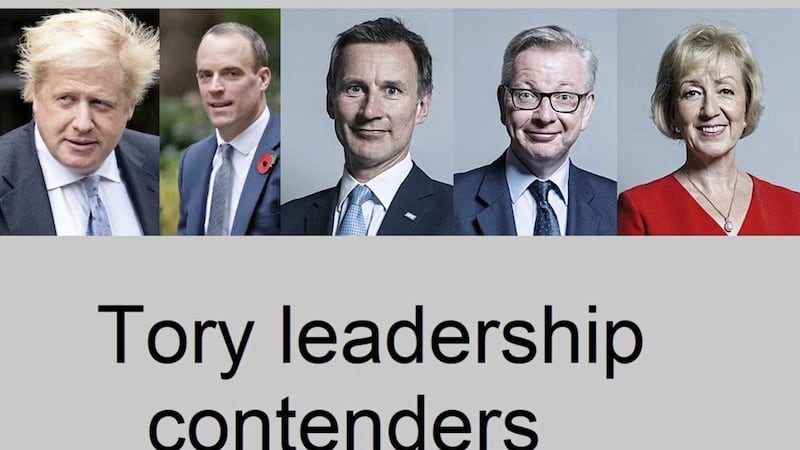It was arrangements for the post-Brexit Irish border that ultimately cost Theresa May her job. Political Correspondent John Manley looks at the recent record of the main Tory leadership contenders on matters relating to Northern Ireland while assessing their prospects for striking a deal with the EU.
BORIS Johnson is earmarked as the most likely successor to Theresa May. The former foreign secretary is no stranger to controversy and on his past record he appears unlikely to endear himself to Irish nationalists any time soon. For starters, earlier this year he claimed any prosecutions of British army veterans serving on Bloody Sunday would be about politics rather than justice.
"What kind of a world is it – you may ask – where we can put former squaddies in the dock for murder, and simultaneously tell IRA killers that they can get away with it?" he wrote in the Daily Telegraph in March.
On Brexit, Mr Johnson has been broadly aligned with the DUP and was guest speaker at the party's conference in Belfast last autumn, where in addition to voicing support for the far-fetched bridge to Scotland plan, he said the British government was making a historic mistake if it did not "junk the backstop".
In the past the MP for Uxbridge and South Ruislip has said that concerns about the negative effects Brexit may have been exaggerated and that it was “beyond belief” that relations in Northern Ireland dictated the debate.
In June last year, an audio recording emerged where Mr Johnson likened concerns about the Irish border to “pure millennium bug stuff”, while elsewhere he has insisted there are "very good solutions" to avoid a hard border.
You'd like to be a fly on the wall when Prime Minister Johnson meets Leo Varadkar for the two leaders' first official meeting, and likewise witness a face-to-face with the man the bookies rank as most likely to challenge the former foreign secretary for the Tory leadership.
In January this year, ex-Brexit secretary Dominic Raab accused the taoiseach of leaking and misrepresenting a conversation he'd had with Tanáiste Simon Coveney.
An account of the conversation reported in the Daily Telegraph said Mr Raab had demanded the right to pull the UK out of the backstop after just three months.
A Dublin government spokesman rubbished the claim, adding: "Mr Raab should produce any evidence if he has it."
The following month, the former Brexit secretary was left publicly embarrassed after being forced to admit he hadn't read the Good Friday Agreement.
He told the Northern Ireland Affairs Committee he hadn't sat down and read the 32-page document “like a novel” from start to finish.
Former education secretary Michael Gove appears to not only have read the 1998 peace accord but regards himself as something of an expert.
In an academic paper he penned in 2000, the bookies' third favourite for the top Tory job said he believed the Good Friday Agreement negotiations "could have been handled in a different way".
In 'Northern Ireland the Price of Peace', Mr Gove wrote that he believed the IRA could have been defeated and the agreement was a capitulation to the Provisionals by Tony Blair.
He argued that the SAS should have been allowed to continue operations in the north and could have defeated the IRA.
"After Loughgall and Drumnakilly, the government had become cautious, worried about shoot-to-kill accusations," he said.
His views on Brexit arguably aren't as strident as Johnson or Raab's and in the past, in remarks that appeared to be aimed primarily at the DUP, has warned that withdrawing from the EU without a deal could lead to Westminster imposing direct rule in Northern Ireland.
Mr Gove also claimed a no deal Brexit would be disastrous.
Foreign secretary Jeremy Hunt's pro-Remain stance at the time of the referendum may make him slightly more appealing to most people on this side of the Irish Sea though it's something that may also thwart his leadership ambitions, as many Tories regard him as 'nouveau Brexiteer'.
He has been more conciliatory than those the bookies rate as more likely to succeed Theresa May, arguing in March that the UK should be prepared to be flexible over how to address concerns about the backstop. in an effort to strike a deal with the EU.
Andrea Leadsom, the most likely female candidate to secure the Tory leadership, is clearly not especially enamoured by the withdrawal agreement as it currently stands, as it was Mrs May's effort to bring it before MPs for a fourth time which prompted her to resign as leader of the House of Commons earlier this week, precipitating the heave against the prime minister.
She has been adamant in the past that the Tory government will not sign up to a deal that breaks up the UK.
Assessing the frontrunners in the Tory leadership race, it would appear Mrs May's successor is unlikely to as receptive to the idea of a backstop as the departing prime minister was, which can only make the likelihood of a no deal Brexit greater.
*Bookies prices on who'll be the next prime minister*
Boris Johnson 5/6
Dominic Raab 6/1
Jeremy Hunt 11/1
Michael Gove 11/1
Andrea Leadsom 20/1
Rory Stewart 20/1
Graham Brady 20/1
Prices from Paddy Power








